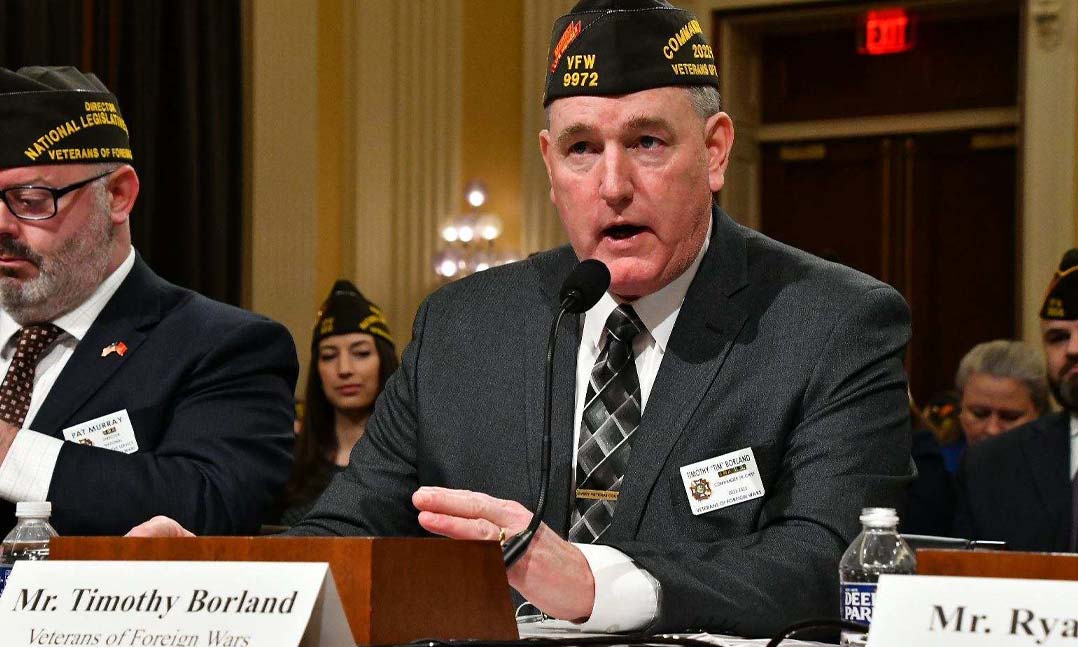WASHINGTON — In a standing-room-only packed chamber in the Cannon House Office Building, Veterans of Foreign Wars (VFW) National Commander Tim Borland delivered his message of “Every Veteran Counts” during in-person testimony before the 118th Congress during a special joint hearing of the House and Senate Committees on Veterans’ Affairs held today.
Backed by almost 400 VFW and VFW Auxiliary members in the audience and two overflow rooms, Borland recounted the VFW’s efforts in championing the Sgt. 1st Class Heath Robinson Honoring Our PACT Act of 2022, or the PACT Act, which was passed into law in August of last year. He also talked about how the VFW is helping process VA claims as a result of the most comprehensive toxic exposure legislation in American history.
“All across the country VFW Service Officers are assisting veterans with their PACT Act claims and have already seen conditions approved and rated,” said Borland. “This service has already helped thousands of veterans free of charge.”
 Borland bridged from the success of the PACT Act to Dependency and Indemnity Compensation (DIC) paid to the survivors of service members who died in the line of duty or veterans who died from service-connected injuries or illnesses. He said that while the PACT Act finally fulfills a critical promise to many survivors who now qualify for benefits, DIC is still not equal to other federal survivor programs.
Borland bridged from the success of the PACT Act to Dependency and Indemnity Compensation (DIC) paid to the survivors of service members who died in the line of duty or veterans who died from service-connected injuries or illnesses. He said that while the PACT Act finally fulfills a critical promise to many survivors who now qualify for benefits, DIC is still not equal to other federal survivor programs.
“The VFW urges Congress to pass legislation that would finally increase DIC payments to survivors from 43% to 55%, reaching parity with other federal agencies,” said Borland.
One topic of heavy emphasis was the concerning predatory claims consultants which the VFW calls “claim sharks.” Borland testified that under VA regulations, fees charged for claims assistance are capped and usually apply only to a percentage of retroactive benefits. However, he pointed out, that many of these unaccredited consultants use contracts that include a commitment by the veteran to pay the “claim shark” all or a significant portion of their increased benefits.
“This is why we strongly urge the passage of the GUARD VA Benefits Act,” said Borland. “If VFW representatives charged for claims help, they would lose their accreditation and be subject to both fines and jail time. ‘Claim sharks’ should be treated the same way.”
“Companies that prey upon veterans and blatantly disregard congressional oversight authority should be held accountable. Period!” said Borland.
Veteran suicide prevention is a complex, multifaceted initiative requiring an approach informed by a multitude of upstream and protective factors. Borland implored committee members to work with the Department of Veterans Affairs to look beyond mental health and to other contributing factors to the epidemic, such as economic opportunity.
“This is why the VFW believes VA’s Office of Suicide Prevention needs to be moved out of [Veterans Health Administration] over to the enterprise level of VA so it can report on and utilize information from across the agency to combat suicide,” said Borland. “Access to economic opportunity benefits from the point of transition is critical. We owe it to our veterans to understand every access point to VA and how it affects their well-being.”
A reoccurring issue Borland addressed is improving the military’s Transition Assistance Program. He said that service members have a very slim window in which they are eligible to file for VA disability benefits through the VFW’s Benefits Delivery at Discharge program, also called BDD. While the VFW’s BDD representatives are currently supporting transitioning service members at 20 military installations, there needs to be more access to more installations to help service members face fewer hurdles during transition.
“Senior military leaders understand this,” said Borland. “For example, retiring generals and senior non-commissioned officers frequently reach out to the VFW for more in-depth knowledge on the VA benefits process.
“If our military leaders see this as a priority, then VA should make it a priority for everyone leaving the military,” said Borland.
One of the long-standing legislative priorities of the VFW is ending the practice of offsetting DOD retirement and VA disability pay. Borland urged Congress to pass the bill which would end requiring veterans to forfeit all or part of one benefit, even though the benefits are earned for entirely different reasons.
“Though I recently called on the White House and Congress to push for full concurrent receipt for all military retirees, the VFW’s first priority is to solve this injustice for medical retirees through the Major Richard Star Act,” said Borland.
The bill, named after U.S. Army Maj. Richard Star, who was forced to medically retire after he was diagnosed with cancer in 2018 and died in 2021, was introduced in the House of Representatives today.
The last issue Borland addressed was that of recognizing service members serving in eastern Europe to support NATO after Russia’s invasion of Ukraine. He said that the global security situation demanded that U.S. service members be quickly sent to the defense of NATO allies, and recognizing those serving in a forward operational capacity with a medal is the right thing to do.
“The VFW calls on the DOD and Congress to properly recognize the immense contributions of those who served and are serving on the eastern flank of NATO by awarding them the Armed Forces Expeditionary Medal for deterring Russian aggression,” said Borland.
“I will conclude with my call to action and remind everybody that we must meet the challenge to take care of these critical issues for those we represent because ‘Every Veteran Counts’,” said Borland.
Video of today’s testimony is available to watch and share here. Read Commander Borland’s full testimony here.